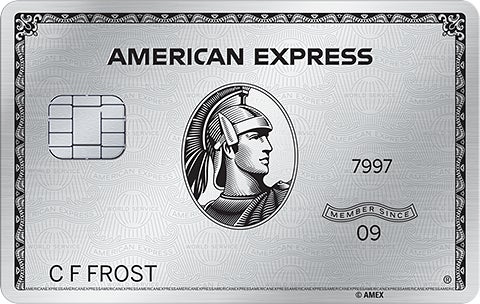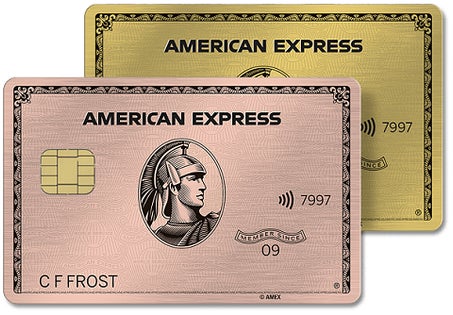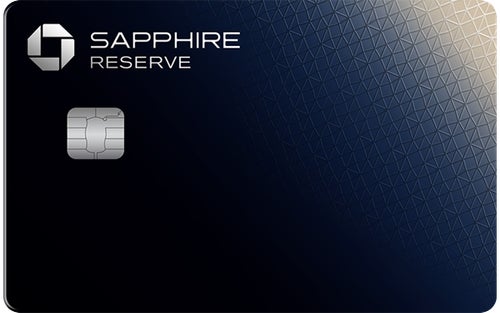| Rewards Rating: | 4.8 / 5 |
| Rewards Value: | 4.8 |
| Annual Percentage Rate: | 3.0 |
| Rewards Flexibility: | 4.0 |
| Features: | 4.0 |
| Issuer Customer Experience | 4.0 |
In a Nutshell:
The price of admission for this luxury card is steep, but its large sign-up bonus and generous travel allowance more than make up for the annual fee.
Rewards Rate
|  |
Sign-up Bonus
|  |
Annual Bonus
|  |
Annual Fee $795 |  |
APR 19.49% - 27.99% Variable |  |
Chase Customer Service Ratings
|  |
Other Notable Features: $300 annual travel credit; up to $120 Global Entry/NEXUS/TSA PreCheck® credit; no foreign transaction fee; complimentary access to more than 1,000 airport lounges; select Visa Infinite hotel, air and car rental perks; trip cancellation and interruption insurance; car rental insurance; baggage delay insurance; lost luggage insurance; trip delay insurance; purchase protection; return protection; extended warranty; 24/7 customer service; exclusive events and experiences; zero fraud liability; year-end summary; $10 monthly Lyft credit, up to $120 annually (activate by Sept. 30, 2027); free DashPass membership for one year (activate by Dec. 31, 2027)
Long considered one of the best travel credit cards on the market, the Chase Sapphire Reserve boasts some of the most generous travel perks available on a rewards card.
If you’re eager to travel more, the Chase Sapphire Reserve stands out as a terrific option. Not only can you score a valuable sign-up bonus to get you off on the right foot, but thanks to its flexible travel credit, lounge access, and other plush benefits, as well as a great ongoing rewards rate, the Sapphire Reserve can also be a valuable long-term addition to your wallet despite its high annual fee.
Read on to learn more about the Sapphire Reserve card’s value versus its cost, who this card is best for, other cards to consider, and its pros and cons.
See related: Best Ultimate Rewards cards
Pros
- Offers some of the highest rewards rates available for travel and dining when booked through Chase Travel
- Point values are boosted when redeemed for travel through the Chase Travel portal
- Cardholders receive an automatic $300 travel credit each year on account anniversary, which can help to recoup the high annual fee
- This card has one of the most robust collections of travel protection benefits available
Cons
- Charges a $195 annual fee per authorized user in addition to the $795 annual fee
- Lacks luxury airport lounge and hotel options compared to competitors
- Does not offer an introductory APR period
Why you might want the Chase Sapphire Reserve card
Whether you’re an Ultimate Rewards fan eager to maximize the value of your points or a frequent traveler looking to add some luxury perks to your toolkit, the Sapphire Reserve stands out as one of the best premium travel cards out there. Though the card carries a high annual fee, the card’s flexible travel credit and benefits can easily cover the cost if you take full advantage. Plus, the card offers extremely flexible rewards redemption options.
Here are some of the key advantages the Sapphire Reserve offers as a travel rewards card:
Valuable sign-up bonus
One of the most eye-catching features of the Chase Sapphire Reserve is its sign-up bonus. Currently, cardholders can earn 125,000 points, for spending $6,000 in the first three months. Even though the spending requirement is a bit higher, this is a great step up from the previous offer of 100,000 bonus points + 500 Chase Travel℠ credit after spending a thousand less in the same time frame.
Assuming a 1-cent-per-point value when redeemed for travel purchases through Chase Travel℠, this bonus is worth about $1,250. That’s one of the higher sign-up bonuses currently available on a travel card and can help offset the card’s annual fee in the first year. Meanwhile, the spending requirement, though high, should still be attainable if you put all your spending on the Sapphire Reserve for your first three months ($2,000 per month to reach the $6,000 threshold).
Top-notch perks can cover the annual fee
The Chase Sapphire Reserve card’s annual fee can be a big deterrent for moderate spenders, but the card is less costly than it seems. Even after your first year, with no sign-up bonus at play, the card’s travel credits and other benefits can easily chip away at this cost on an ongoing basis.
Valuable annual travel credit
Chase Sapphire Reserve cardholders are awarded a $300 credit each year to use toward travel purchases. This credit is one of the most flexible among luxury travel credits, as it can be used toward a wide variety of purchases, including – but not limited to – these expenses:
- Flights
- Hotel stays
- Parking garages
- Toll booths
- Pedicab rides
- Taxi rides (including ride-share services)
- Uber Eats purchases
- Public transportation
While many luxury cards limit their credits to purchases with a particular airline or hotel, the Chase Sapphire Reserve’s travel credit is easy to take advantage of. Any time you make a qualifying purchase, you will be automatically awarded a statement credit to cover it – until your $300 annual credit is reached. If you already spend at least $300 on these types of transactions a year, this can make a massive dent in the annual fee.
Priority Pass lounge access
On top of this, the Chase Sapphire Reserve comes with complimentary access to the more than 1,700 Priority Pass lounges worldwide. Access is unlimited, and each cardholder can bring up to two complimentary guests ($27 per additional guest). Any authorized users on the card are allowed their own access as a bonus – with their own guests. That means you can add a spouse or family member as an authorized user to bring more people into the lounge on each visit.
Considering a Priority Pass Prestige membership costs $469 per year and offers free member visits to lounges and $35 guest visits, the comparable Priority Pass Select membership included with the Sapphire Reserve is quite a deal.
Credits for TSA PreCheck or Global Entry
The Chase Sapphire Reserve card will also cover the cost of your application for Global Entry, NEXUS or TSA PreCheck once every four years. These programs can make your travel experience much smoother: With TSA PreCheck, you can go through the PreCheck security line at the airport; with Global Entry, you can use the Global Entry kiosk to streamline your entrance to the country instead of visiting a border agent; and NEXUS specifically expedites processing when entering the United States and Canada.
When you apply to any one of these programs and pay with your Sapphire Reserve card, you’ll automatically receive a statement credit to cover the fee (up to $120 based on the program fee).
Solid ongoing rewards
It’s not just the Sapphire Reserve card’s sign-up bonus and perks that impress, however. The card also carries a solid ongoing rewards rate, making it easy for frequent travelers to earn Ultimate Rewards points.
It offers one of the highest rates you can get on travel purchases, matching or beating those of top-tier competitors like the Capital One Venture X Rewards Credit Card (which offers 10X miles on hotels and rental cars booked through Capital One Travel and 5X miles on flights and vacation rentals booked through Capital One Travel) and American Express Platinum Card® (which offers 5X points on flights booked directly with airlines or with American Express Travel® on your first $500,000 in spending and 5X points on eligible prepaid hotels booked with American Express Travel).
High point value and flexible redemption
Another big perk to the Chase Sapphire Reserve is that your points can hold more than a 1-cent-per-point redemption value. This significantly impacts the card’s earning rate, as each point you earn could take you further. In fact, based on Bankrate’s valuations, Ultimate Rewards points are among the most valuable rewards currencies available.
See Related: Why are Chase Ultimate Rewards points so valuable?
The card also boasts an almost unparalleled level of redemption flexibility compared to others in its category. Once you’ve racked up points with your Chase Sapphire Reserve card, you also have a variety of redemption options through the Travel portal. You can use Ultimate Rewards points for anything from travel credits to Apple products or apply points toward statement credits, all at a minimum redemption value of 1 cent per point (most competitors force you to sacrifice point value when you opt for non-travel redemptions).
| Redemption option | Point value |
| Travel purchases (through the Chase Travel portal) | At least 1 cent |
| Regular travel redemption | 1 cent |
| Statement credit | 1 cent |
| Direct deposit | 1 cent |
| Gift cards | 1 cent |
| Apple products | 1 cent |
| Amazon.com purchases | 0.8 cents |
| Chase Pay purchases | 0.8 cents |
If you are a fan of juggling rewards cards, the Chase Sapphire Reserve also makes a great pair to other Ultimate Rewards credit cards. Chase makes it easy to pool points between these accounts, so you can carry cards with bonus points in different categories of purchases to boost your overall rewards rate. The points you earn with a no-annual-fee card like the Chase Freedom Unlimited® card – which earns at least 1.5% cash back on purchases – would be worth more if you pooled points with the Sapphire Reserve.
That’s because Chase travel partners offer point transfers at a 1:1 rate. Since some airline miles and hotel points are worth more than 1 cent per point, you may even be able to stretch your points further this way.
Tip: You can also use the Chase Pay Yourself Back feature to redeem points to pay for some or all of your purchases in select categories and get paid back with a statement credit.
Other handy perks for frequent travelers
Along with its flashier perks like the travel credit and credit for expedited security screen, the Sapphire Reserve boasts several valuable benefits for frequent travelers, including:
- Primary card rental insurance – One of the hidden perks of the Chase Sapphire Reserve is its top-tier car rental insurance. If you decline the rental company’s collision insurance on a car you’ve paid for with the Reserve card, Chase will cover you for up to $75,000 in theft or collision damage. The coverage you receive with this card is primary (both in the U.S. and abroad), which means that Chase covers all damages. With secondary insurance – which most rewards cards offer in the U.S. – you’ll only be covered for anything not paid for by your normal insurance policy.
- Trip cancellation and interruption insurance – If you have to cancel or cut a trip short due to illness, severe weather or another covered situation, Chase will reimburse you up to $10,000 per person ($20,000 max per trip) for nonrefundable expenses.
- Lost luggage insurance – If your luggage is damaged or lost by the carrier on your flight, you can be reimbursed up to $3,000 per passenger.
- Purchase protection – Eligible purchases on your Chase Sapphire Reserve card are protected against damage or theft for the first 120 days (up to $10,000 per claim, $50,000 per year).
- Return protection – If the store doesn’t take back an item you purchased on your Reserve card in the first 90 days, you can be refunded $500 per item ($1,000 max per year).
- Extended warranty – With this perk, you can extend eligible warranties of three years or less by an additional year.
- Free DashPass membership for one year – DashPass gets you free delivery on qualifying DoorDash orders (usually $9.99 per month, activate by 12/31/2027)
These coverages can save you significant money when shopping or traveling if you use them strategically.
Why you might want a different card
Clearly, the Sapphire Reserve boasts a ton of advantages for frequent travelers, and if you take full advantage, you can easily make up for the card’s costs. However, the card may still fall short in a few key areas, including its rewards rate on general purchases, the scope of its lounge access and the size of its annual fee, which – even if you can justify it on paper – may simply prove too risky for some cardholders.
May not be the most rewarding option
While the right cardholder can cover the Sapphire Reserve card’s annual fee via the card’s generous travel credit and other perks, it may not be the most lucrative option overall if you don’t spend a ton on travel or if you also spend heavily on categories outside of travel and dining.
General purchases earn just 1X points with the Sapphire Reserve, so if you want to earn travel rewards but don’t actually spend a lot of money on travel, you may be better off with a card that earns rewards at a higher rate on general purchases or in popular everyday categories like groceries and gas.
For example, while the Venture X card carries a lower rewards rate on flights (5X miles on flights booked through Capital One Travel), it earns 2 miles per dollar on all other purchases. If you spend more annually on general purchases like groceries and gas than you do on travel, this elevated base rewards rate could earn you more in the long run.
For the sake of simplicity, let’s set aside each card’s annual travel credit (the Venture X also offers $300 in annual credits for bookings through Capital One Travel) and say you spend $3,500 per year on airfare through each issuer’s portal (earning 5X miles with the Venture X and 8X points with the Sapphire Reserve), $2,000 on hotel bookings through each issuer’s portal (earning 10X miles with the Venture X or 8X points with the Sapphire Reserve), $1,800 per year on dining (earning 3X points with the Sapphire Reserve and 2X miles with the Venture X) and $18,000 per year on all other purchases, (earning 1X points with the Sapphire Reserve and 2X miles with the Venture X). Factoring in each card’s annual fee and point value when redeemed for travel, here’s how the math would shake out:
| Card | Rewards calculation | Estimated total |
|---|---|---|
| Sapphire Reserve | ($3,500 x 8 miles) + ($2,000 x 8 miles) + ($1,800 x 3 miles) + ($18,000 x 1 mile) x 1.0 cents per mile value – $795 annual fee | -$121 |
| Venture X | ($3,500 x 5 miles) + ($2,000 x 10 miles) + ($19,800 x 2 miles) x 1 cent per mile value – $395 annual fee | $376 |
As you can see, the Sapphire Reserve card’s low base rewards rate can hold back its earning potential if you spend heavily outside its bonus categories. Plus, the annual fee is inherently risky, no matter how much value you can earn from the card.
If you’re not big on luxury perks, even the lower-tier Chase Sapphire Preferred® Card can offer a lucrative value for just a $95 annual fee.
Not the strongest luxury card lounge offering
Although Priority Pass lounge access gives you plenty of coverage, the Sapphire Reserve card’s lounge access benefits are not the most robust. If that’s your key priority, consider the Amex Platinum, which offers the world’s largest lounge network via Priority Pass and Centurion lounges.
Tough to qualify for
As a luxury credit card, the Chase Sapphire Reserve is one of the more difficult rewards cards to qualify for. It is designed for users with excellent credit (above a 740 FICO score). Some competing luxury travel cards, like the Amex Platinum, are available with good to excellent credit, potentially giving you just a bit more wiggle room for approval.
In addition, Chase is one of the strictest issuers regarding the number of credit card accounts you have open. It holds applicants to the Chase 5/24 rule, which means if you have opened five or more credit card accounts with any issuer in the last 24 months, it is likely you won’t be approved.
If you’re eager to start earning travel rewards but have less-than-excellent credit or can’t make the cut for the Sapphire Reserve due to the number of cards you’ve opened in the last 24 months, consider a mid-tier travel card like the Citi Strata Premier® Card or Capital One Venture Rewards Credit Card – which are both available with only good credit.
How does the Sapphire Reserve compare to other travel cards?
Though certainly one of the most valuable luxury cards, the Sapphire Reserve card might not be the best choice for every kind of spender. Here’s a quick look at some other great alternatives:
 American Express Platinum Card®
|  |  |
Rewards rate
| Rewards rate
| Rewards rate
|
| Welcome bonus | Welcome bonus | Welcome bonus |
Annual fee
| Annual fee
| Annual fee
|
Other things to know
| Other things to know
| Other things to know
|
Chase Sapphire Reserve vs. Amex Platinum
The Platinum Card from American Express is packed with travel credits and protections, making it a valuable option for frequent travelers – especially people who love luxury perks. Take a close look at this card’s list of perks and ask yourself whether you can take full advantage. If so, it could easily be the most lucrative card on the market; if not, it may end up being a very expensive coupon book. As with the Sapphire Reserve, another major downside with the Amex Platinum is that its ongoing rewards rate makes it hard to earn points on non-travel purchases.
See related: Chase Sapphire Reserve vs. Amex Platinum
Chase Sapphire Reserve vs. Capital One Venture X
Undoubtedly one of the best travel cards out there, the Venture X focuses on practical value with both its perks and rewards rate, offering one of the highest base earning rates available on a luxury travel card (2X miles) as well as two key annual bonuses – $300 back in annual credit each year for Capital One travel bookings and 10,000 bonus miles each account anniversary – that cover the card’s cost on their own. If you’re considering the Sapphire Reserve but aren’t entirely convinced it’s worth the annual fee, the Venture X could be a terrific alternative.
Chase Sapphire Reserve vs. Amex Gold
The American Express® Gold Card has fewer travel credits than other luxury cards, but its annual fee is much more affordable. It is particularly rewarding for foodies, including a generous rewards rate on worldwide restaurants and U.S. supermarket purchases. If you want to earn travel rewards, but your spending is largely focused on everyday purchases at restaurants and U.S. supermarkets, the Amex Gold can be a very lucrative option and a great entry point to the world of luxury travel cards.
How to use the Chase Sapphire Reserve:
- Spend at least $6,000 in the first three months to qualify for the sign-up bonus.
- Use the $300 travel credit as soon in the year as possible.
- Book travel through the Chase Travel portal to get the most value out of your points.
- Consider applying for another Ultimate Rewards credit card to boost your rewards rate.
- Check Chase Offers regularly to earn bonus points on everyday spending.
Is the Chase Sapphire Reserve right for you?
If you already spend at least $300 per year on travel purchases, including parking garages or ride-share services, the Sapphire Reserve travel credit takes a decent chunk out of the annual fee, and with an impressive list of generous travel protections and benefits, even a moderate spender can get significant value out of the card.
That said, if you spend heavily in categories outside of dining and travel, it’s worth doing the math to see if a card that carries a lower annual fee or offers bonus rewards in a wider variety of non-travel categories is a better fit for you.
All reviews are prepared by CreditCards.com staff. Opinions expressed therein are solely those of the reviewer and have not been reviewed or approved by any advertiser. The information, including card rates and fees, presented in the review is accurate as of the date of the review. Check the data at the top of this page and the bank’s website for the most current information.
Responses to comments in the discussion section below are not provided, reviewed, approved, endorsed or commissioned by our financial partners. It is not our partner’s responsibility to ensure all posts or questions are answered.
Partner Offer
